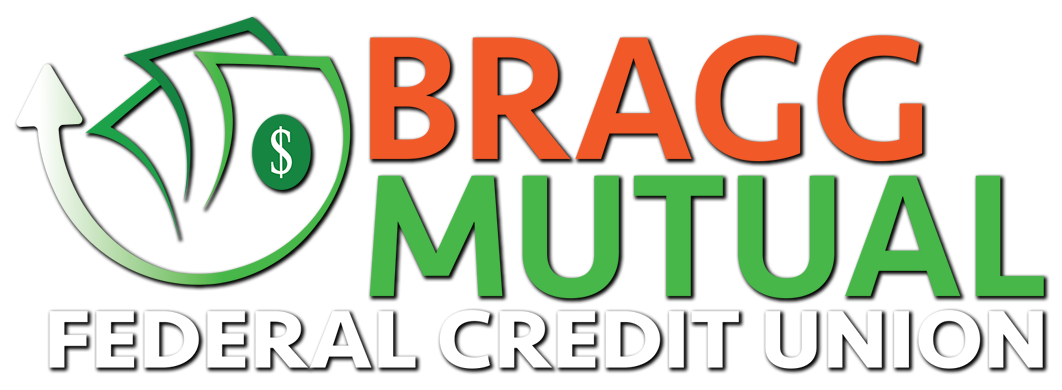Bragg Mutual Cybersecurity Services & Fraud Awareness
Bragg Mutual Cybersecurity Services is a new and complimentary platform that all BMFCU members can access. Most of our members should have received an enrollment e-mail. If you are a member and did not receive your e-mail, log into online banking and make sure that your e-mail address is up to date. Follow the directions below to enroll for Bragg Mutual Cybersecurity services!
Enrollment
If you received an enrollment e-mail, you can follow the instructions in the e-mail to enroll.
If you prefer to enroll over the phone, you can dial 1-800-660-7240 and speak with a member service specialist.
Click on the button below to enroll via the web.
ENROLL NOWProtect Your Identity
Ensuring your financial health also means protecting yourself against today’s identity theft and cyber threats. Bragg Mutual helps all our members stay safe and secure with Intelligent Identity Security services from Sontiq, a TransUnion company.Now you now have the tools needed to ensure your digital safety and security, including:
- Hyper-personalized identity safety intelligence. View your dynamic Identity Safety Score, which details your individual risk level. You’ll also see how a data breach impacts you personally and the specific steps to take in response.
- Dark Web monitoring. Receive notifications and individual action steps if your credit card details, passwords, and personal information are detected in the black-market chat rooms and forums used to trade stolen data.
- Identity restoration. Sontiq’s dedicated team of specialists can save you hundreds of hours by filling out any paperwork, making the necessary calls, and doing the heavy lifting needed to restore your identity.
Fraud & Cybersecurity News
A Message from Bragg Mutual
Take care to protect your cell phone
We urge our members to treat their phones with the same level of caution as they would their wallets. If approached by someone asking to borrow your phone, especially in a public setting like a parking lot, we recommend declining and offering to make the call or transfer on their behalf if necessary.
We also encourage members to enable additional security features within payment apps—such as Face ID or biometric authentication—on for your online banking app and other financial apps you may use.
Are you at risk for identity theft?
Are you taking the steps necessary to protect your identity and personal information? Click on the link below to take a short quiz that can help you evaluate your habits regarding protecting your information!
How to avoid & prevent typical fraud schemes
Before you make a large cash withdrawal from your Bragg Mutual Federal Credit Union account(s), please review this information on protecting yourself from fraud.
First: Someone unexpectedly engages you in an online friendship or other relationship.
Then: After establishing trust, the scammer asks you to withdraw cash, send a wire transfer, or purchase pre-paid gift cards. After getting as much money as possible, they disappear.
Prevent it: Do not give or lend money to someone you have never met in person, and you only know online. This includes dating sites.
First: You receive a direct phone call from someone claiming they are an agent of the IRS or another law enforcement agency.
Then: The fraudster claims you owe unpaid taxes. They may be abusive and threaten arrest or deportation if the taxes are not paid immediately.
Prevent it: Reject any demand to pay US taxes using cash or gift cards. Also remember that the IRS will never make initial contact with a taxpayer by email or phone or threaten arrest to obtain payment.
First: You receive an online offer for an investment opportunity promising quick profits.
Then: Fraudsters request your account information, where money will be deposited from other supposed investors. You are then asked by the fraudster to send most of the money to them. The money is actually stolen, implicating you in this illegal scheme.
Prevent it: Only disclose your account information to sources that you have verified to be legitimate.
First: You receive a response to an advertisement you posted online. Or someone contacts you to say you won the lottery or are the recipient of an inheritance. They send a check that appears real in a larger amount than what was supposed to be sent.
Then: The fraudster asks you to deposit the check and return a certain amount to them. The check, however, is counterfeit. Any amount you transfer to them is debited from your account before the check is returned unpaid.
Prevent it: Never send money to a stranger after receiving a check from them.
The above list is not exhaustive. Scammers find new ways to steal your money, including:
Mortgage closing costs scams: If you get an email with new payment instructions for closing costs, confirm with your attorney by phone or in person. Fraudsters may have stolen your info from another party in the transaction, such as a title company.
Lottery & sweepstakes scams: Scammers call, email or text you to congratulate you on winning a lottery, drawing, or sweepstakes you may not have even entered. The scammer asks for an upfront payment to cover processing fees or taxes.
Grandparent scams: An imposter calls pretending to be your grandchild in trouble, often using their real name, and pleads for you to immediately withdraw cash or wire money without telling any family members to avoid upsetting them.
Charity scams: A thief poses as a real charity or a made-up charity that sounds real.
How to avoid falling victim to ATM fraud
While ATM owners — often small businesses — are the direct victims of jackpotting, consumers should still be cautious when using ATMs. Other types of ATM fraud, such as skimming and card cloning, are more likely to affect individual bank accounts.
Here are a few tips for avoiding ATM fraud:
- Stick to secure ATMs. Use machines located in well-lit, high-traffic areas, preferably inside bank branches or trusted businesses.
- Inspect ATMs for skimmers before you use them. Look for loose or bulky attachments on the card reader or keypad. Wiggle the card slot (it should feel secure). If anything looks off, walk away.
- Never withdraw money in response to an unexpected call, text or email. No legitimate bank or law enforcement agency will ever ask you to do this.
- Use your bank’s mobile app to set up withdrawal or transaction alerts. These can notify you immediately if your card is used and can help you spot unauthorized activity faster.
- Consider using contactless payment options, like Apple Pay or Google Pay. This can reduce your exposure to compromised machines and prevent skimmers from stealing your data.
Fortunately, the jackpotting scheme allegedly doesn’t affect your personal account if it’s used to facilitate a scammer’s withdrawal, but it acts as a good reminder to try and prevent other fraudulent activity that can.
The Latest Scams You Need to Be Aware of in 2025

The new year doesn't necessarily bring about a shift in scam tactics. In fact, over the years, many scams have slowly evolved as scammers incorporate new technology and play off of the most recent major events. But there is a general sense that scams and fraud have become increasingly common around the world. The Global Anti-Scam Alliance (GASA) reports that over $1.03 trillion was lost to scammers in 2024. Scammers almost always have the same goal—to get your personal information or money. Learning about the latest developments will hopefully help you stay one step ahead. The latest scams to watch out for in 2025 include AI-powered scams, imposter scams and investment scams.
Chinese Innovations Spawn Wave of Toll Phishing Via SMS
Residents across the United States are being inundated with text messages purporting to come from toll road operators like E-ZPass, warning that recipients face fines if a delinquent toll fee remains unpaid. Researchers say the surge in SMS spam coincides with new features added to a popular commercial phishing kit sold in China that makes it simple to set up convincing lures spoofing toll road operators in multiple U.S. states. Last week, the Massachusetts Department of Transportation (MassDOT) warned residents to be on the lookout for a new SMS phishing or “smishing” scam targeting users of EZDriveMA, MassDOT’s all electronic tolling program. Those who fall for the scam are asked to provide payment card data, and eventually will be asked to supply a one-time password sent via SMS or a mobile authentication app
Impersonation Scams

Fraudulent calls, texts, and emails that seem to come from a legitimate source are a growing problem. The piercing ring of the telephone interrupts your dinner - an authoritative yet friendly voice on the other end explains that your Social Security number has been compromised and your checking account has been frozen. As the caller rattles off the last few digits, panic sets in. They request personal information to "resolve this issue" and restore your account. What should you do? Financial scams come in many forms, and they often start with a call, text, or email that looks like it came from your financial institution, but it didn't. Criminals abuse the trust we have in our institutions to scam us out of not only money but also personal information that can be used for identity theft.
Employees Hailed for Helping Save Member from Virtual Kidnapping Scam
KENNIWICK, Wash.–A “quick-thinking” employee at a credit union here is being credited with helping to save a mother after she was targeted in a virtual kidnapping scam. According Tri-Cities Credit Union, a “distraught” woman entered one of its branches and gave the teller a handwritten note, asking them to call her husband because their daughter had been kidnapped. Tri Cities The Spanish-speaking fraudsters had earlier called the woman to tell her that they had kidnapped her daughter, the credit union said in a statement. Tri-Cities CU said the scammers were able to track the location of her and her daughter’s phones and knew where they lived. The Tri City Herald reported that the scammers would not allow the woman to hang up, and told her that if she texted anyone they would know. They would also periodically hang up and call back from a different number.
CFPB fines Chime $3M for app’s UDAAP, remittance issues
The CFPB Tuesday issued an order against Chime for deceiving consumers about the speed and cost of remittance transfers through its mobile app, Sendwave. The bureau ordered Chime to refund affected consumers nearly $1.5 million in fees and pay a $1.5 million penalty into the CFPB’s victims relief fund.
Gig Economy Platforms See Higher Rate of ID Theft
CHICAGO–Nearly one in four (24%) Americans have been victimized by fraud or identity theft while using gig economy platforms, like delivery and ride-sharing apps, which is more than double the rate they experienced elsewhere, according to a new study.
The findings were released by TransUnion as part of a comprehensive 2023 U.S. Gig Economy Report, which studies the attitudes, behaviors and experiences of Americans participating in the gig economy as workers, consumers or both.



